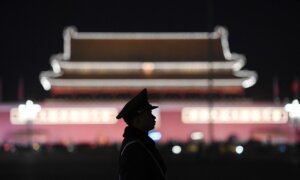The U.S. Commerce Department has implemented new export controls on some laboratory instruments, citing national security concerns regarding artificial intelligence (AI) and data science.
The Commerce Department’s Bureau of Industry and Security (BIS) announced in a statement on Jan. 15 that the latest export controls apply to high-parameter and spectral flow cytometers and certain liquid chromatography-mass spectrometers.
The bureau said the equipment is generally used for innovation in health, food, and agriculture, but it can also be misused by “countries of concern” to develop weapons.
“This misuse includes training artificial intelligence systems for the development of certain militarily relevant applications, including as well as but not limited to human performance enhancement, brain-machine interfaces, biologically-inspired synthetic materials, and possibly biological weapons,” the BIS said.
Undersecretary of Commerce for Industry and Security Alan Estevez said in a statement that “throughout the Biden–Harris administration, BIS and its interagency partners have carefully assessed critical technologies, including those related to biotechnology, to determine if additional export controls are warranted.”
“We have strategically crafted these controls to focus on countries of concern while preserving the global community’s ability to responsibly use these laboratory instruments to advance the significant beneficial uses of biotechnology,” Estevez said.
The BIS’s decision marks the latest effort by the U.S. government to stem the flow of U.S. technology to China. On Jan. 13, the Commerce Department took new steps to further restrict the distribution of AI technology and its chips to foreign adversaries, including Russia and China.
The U.S. government has raised concerns that China could utilize U.S. technology to boost its military capabilities and build new weapons using artificial intelligence.
In February 2024, President Joe Biden signed an executive order preventing hostile nations from acquiring sensitive personal data from Americans, including genomic, biometric, personal health, geolocation, and financial information.
The Department of Justice issued the final rule implementing Biden’s executive order last month. The rule details a new regulatory program to safeguard bulk U.S. sensitive personal data from countries of concern, namely China, Cuba, Iran, North Korea, Russia, and Venezuela.
The House passed the bipartisan Biosecure Act (H.R. 8333) on Sept. 9, 2024, by a vote of 306 to 81. The legislation would ban federal agencies from contracting with any Chinese “biotechnology company of concern,” such as Beijing Genomics Institute (or BGI), MGI, Complete Genomics, WuXi Apptec, and WuXi Biologics.
The legislation would also ban federal loans or grants from being used to “procure, obtain, or use any biotechnology equipment or services” from Chinese biotech companies deemed a concern.
The Senate version of the legislation was approved by the Committee on Homeland Security and Government Affairs in September 2024.
A bipartisan group of lawmakers, including Reps. John Moolenaar (R-Mich.) and Raja Krishnamoorthi (D-Ill.), sent a letter to Commerce Secretary Gina Raimondo on Jan. 9 asking her department to consider imposing a licensing restriction on U.S. biopharmaceutical companies seeking to work with Chinese medical entities with ties to the Chinese military.
The Chinese regime “has identified the flow of U.S. IP and data to PLA medical infrastructure as a crucial component” of its effort to strengthen its national power, the letter reads, using the acronym for China’s military, the People’s Liberation Army.
Sens. Marco Rubio (R-Fla.) and Mark Warner (D-Va.) wrote to Raimondo in February 2024 expressing concerns that her agency had not done enough to prevent adversaries from accessing U.S. technology, capital, data, and talent in critical technology sectors.
“We urge the Commerce Department, in cooperation with the Treasury Department and the Intelligence Community, to take a comprehensive approach to protecting American technology, investment, data, and talent in critical technology sectors, such as biotechnology,” the two senators wrote.
In July 2023, Rubio, whom President-elect Donald Trump nominated to be secretary of state in his incoming administration, introduced the Stopping Genetic Monitoring by China Act, intending to add U.S. genetic sampling and testing kits, analytical technology, and software to the BIS’s control list.
“This bill would cut off the supply of American genetic technology to China,” Rubio said in a statement at the time. “America has no business aiding China’s crimes against humanity.
“We cannot allow Beijing to continue to use our technology to violate the human rights of its own people.”
Reuters contributed to this report.














